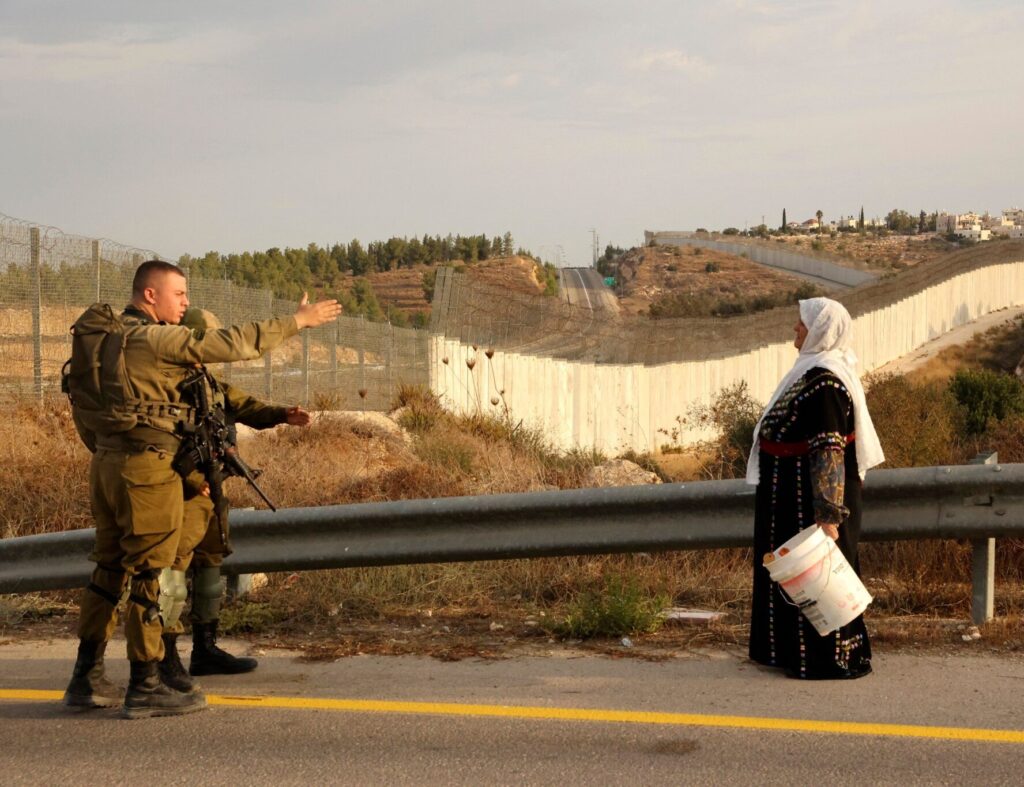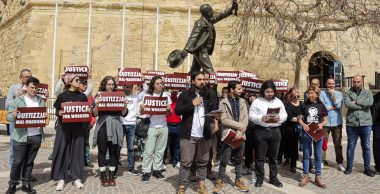As Israeli actions aimed at grabbing Palestinian land, making Palestinian lives miserable and murdering them on a mass-scale intensify and become more and more shameless, accusations of anti-Semitism increasingly feature in the debate concerning Israel and its actions.
What are we to make of these accusations? Do they point to a real, widespread, problem of anti-Semitism among those levelling criticism at the State of Israel? Or should the problem of anti-Semitism be dismissed altogether as a cynical ploy to silence such criticism?
It is crucial to point out from the outset that the problem of anti-Semitism cannot be dismissed. The prejudice against or hatred of Jews has deep roots and tragic consequences. However, to determine the presence of anti-Semitism in discourse and actions concerning Israel we need to make our way through the lies and logical fallacies surrounding this issue.
‘Anti-Zionism is a form of anti-Semitism’
French President Emmanuel Macron had declared that anti-Zionism is a form of anti-Semitism, going on to state that France will adopt the International Holocaust Remembrance Alliance (IHRA) definition of anti-Semitism. Among the examples accompanying this definition, most of them outlining cases which are undoubtedly anti-Semitic, one finds that “claiming that the existence of a State of Israel is a racist endeavour” is anti-Semitic.
This is a point worth exploring in some depth since many accusations of anti-Semitism employ this line of thought, namely: criticising the State of Israel or the ideology underpinning it – Zionism – breeds anti-Semitism since it directly or indirectly erodes the legitimacy of the only state which views itself a Jewish state. For example, most accusations of anti-Semitism levelled against former British Labour Party leader Jeremy Corbyn revolve around this notion.
In order to assess this claim it is first imperative to provide a historical perspective to Zionism and the Jewish State of Israel. The Zionist political ideology started developing in Europe in the late 1800s, heavily influenced by two ideologies that were strong at that juncture: nationalism and imperialism. Zionists promoted the creation of a Jewish national homeland in Palestine through the colonisation of land they considered inhabited mostly by ‘inferior’ non-Europeans. Initially, Zionism was embraced by a very small minority of European Jews since most saw themselves as belonging to those places they had lived in for centuries. The idea of living in some far-away foreign land was not that attractive. Moreover, the small Jewish communities that lived in Palestine had no national aspirations for a Jewish state. Zionism was, in fact, an alien concept to Jews who lived in Arab countries or elsewhere outside Europe.
For European Jews, the overall rejection of Zionism changed as a result of the unprecedented level of persecution suffered in the 1900s, when many Jews in Europe came to accept the idea of establishing a national homeland that could serve as a refuge from genocidal racism.
The Zionist project was at first enabled by the British colonisation of Palestine, with the British administration allowing Zionist organisations to establish Jewish settlements in Palestine and set up Zionist armed militias such as the Haganah, Irgun and Stern. When the British decided to abruptly terminate their ‘mandate’ in Palestine, Zionists faced a seemingly insurmountable obstacle in their plan to create a Jewish state. After nearly three decades of Zionist-sponsored Jewish migration to Palestine, the Jewish population was nowhere near constituting a majority in that land. In 1948, the year the State of Israel was created, it only accounted for 35% of the population of historic Palestine. Despite being in a minority, the United Nations partition plan gave 55% of Palestinian land for a Jewish state. However, there was no clear Jewish majority even within the part earmarked for this state, since the Palestinian and Jewish populations there were roughly equal in number.
As Zionist colonisation aided by the British had not been enough to secure the Jewish majority needed for a Jewish state, the Zionists embarked on systematic ethnic cleansing of the Palestinian population in the days preceding and following the proclamation of the State of Israel, in what became known to the Palestinians as the Nakba, the catastrophe. Implementing a plan that had been drawn up in minute detail, Zionist militias went around Palestine, killing, instilling fear in and expelling Palestinians from their cities and villages. This resulted in entire Palestinian villages being wiped out and Israel gaining control over 78% of historic Palestine. Over 750,000 Palestinians were expelled to Jordan, Lebanon, Syria and other parts of Palestine. These people and their descendants continue to live as refugees until this day.
However, Israel’s obsession with reducing the number of Palestinians and increasing its territory – the policy of ‘maximum land, minimum Arabs’ – did not end with the Nakba. It is an obsession inherent to the Zionist project, perfectly aware that ongoing violence and dispossession against Palestinians is required in order to maintain a Jewish majority and expand the territory of the Israeli state.
So, does making reference to this historical process breed anti-Semitism by delegitimising an entity, the State of Israel, which identifies as Jewish?
A very important distinction must be drawn between the Zionist ideology of the Israeli state, and Jews. Whilst the Zionist ideology and the consequent establishment of the State of Israel are historically related to a Jewish identity, these are not one and the same. In fact, there are many Jews who do not identify as Zionist, since this is not an ethnic identity but a political ideology. Thus, there is nothing anti-Semitic in questioning the foundations of the Israeli state and its ongoing practices. In other words, the fact that Zionists and the Israeli state appoint themselves as representatives of a Jewish identity is close to irrelevant to the question of anti-Semitism, since they are being criticised for their colonial ideology, and not their identification as Jewish.
Conversely, asserting that criticising Israel’s existence is an attack on Jews (a ‘racist endeavour’, in the IHRA definition) verges on the anti-Semitic since it logically implies that Jews are to be held collectively responsible for Israel and its actions.
‘Israel is used as a euphemism for Jew’
There are individuals or groups, primarily but not exclusively from the far-right, that use the word Zionist or Israel as a euphemism for Jew. For example, the far-right Hungarian Jobbik Party used to declare itself as anti-Zionist, and the Italian fascist group Forza Nova organised protests against Israel. Referring to Zionism and Israel in this context serves to attack Jews by portraying the actions of Israel as representative of a Jewish identity. The reverse also happens when individuals angered by the injustices perpetrated by Zionist ideology and the brutality of the Israeli state blame Jews as a group, or use the term Jew to mean Israel.
This is clearly a form of anti-Semitism. It is wrong and should be unreservedly rejected.
However, the fact that a few anti-Semitic individuals and groups use the term Zionism or Israel as a synonym for Jews does not invalidate the criticism of the many who do not. Criticising Zionism and Israel is objectively not anti-Semitic when such criticism, however damning, is genuinely directed at the ideology and the state.
‘Singling-out Israel’
Detractors of activism in solidarity with Palestine often argue that Israel is being singled out for its actions, proof that the real intention behind criticism of Israel is that of demonising Jews. This argument generally recognises flaws in Israel’s conduct, but emphasises that these flaws receive disproportionate attention due to Israel’s Jewish character, and that activists are silent with regard to human rights abuses in other countries.
This argument rings hollow.
First, what yardstick is being used to measure what is proportionate and what is not? If we acknowledge the full extent of Israeli actions and their devastating impact on Palestinians, then no level of attention to these ongoing acts of colonialism can be considered disproportionate.
Second, it is simply untrue that activists are silent when it comes to human rights abuses by other countries. People who express their solidarity with Palestinians are often vocal about other injustices too. In fact, left-wing activism in solidarity with Palestine traces its roots to the broader movement of solidarity with people struggling against colonialism.
Inevitably, people’s awareness and sensitivities are influenced by their own personal experiences and the context they live in. It is practically impossible to be active about every single injustice going on around the globe. And from the perspective of activists in Western countries, injustice in Palestine hits particularly close to home due to the strong economic, military and political support Western governments provide to the Israeli state as well as their historical role in its establishment.
‘Anti-Semitic tropes’
Apologists for Israel’s colonisation of Palestine sometimes argue that a certain discourse about Israel, such as that dealing with its ability to shape media narratives and to deploy powerful lobby groups, uses anti-Semitic tropes that depict Jews as evil global conspirators with hidden economic and political powers.
For instance, US Democratic Congresswoman Ilhan Omar was accused of drawing on anti-Semitic tropes when she called out the US Congress for being subservient to Israeli lobby groups which wield strong financial and political power. However, Ilhan Omar at no point mentioned Jews, and there is nothing to suggest that she was using the word Israel as a synonym for Jew.
Pointing out the very real power of a state – Israel – has absolutely nothing to do with anti-Semitic tropes attributing secret powers to a group defined in religious or cultural terms – Jews. Those accusing critics of Israel of using anti-Semitic tropes deliberately obfuscate the distinction between ‘Israel’ and ‘Jews’, using these two terms as if they were interchangeable. As discussed above, this is both factually incorrect and also anti-Semitic, since it implicitly attributes collective responsibility to Jews for the actions of the Israeli state.
‘BDS targets Jews or innocent Israelis’
A focal point in the debate over anti-Semitism and criticism of Israel is the Boycott, Divestment and Sanctions (BDS) campaign. Inspired by the South African anti-Apartheid movement, the BDS started in 2005 from a call by Palestinian civil society to exert non-violent pressure on Israel by:
- withdrawing support for Israel and Israeli and international companies and institutions that are involved in the violation of Palestinian human rights
- urging entities to withdraw investments from all Israeli companies and from international companies involved in violating Palestinian rights
- pressuring governments to fulfil their legal obligation to hold Israel to account by ending military trade, free-trade agreements and expelling Israel from international forums.
The BDS campaign has targeted several commercial, academic, sporting and cultural entities and events, both within and outside Israel. For example, it is promoted a boycott of the Eurovision Song Contest in Tel Aviv on the grounds that Israel is “…shamelessly using Eurovision as part of its official Brand Israel strategy, which presents “Israel’s prettier face” to whitewash and distract attention from its war crimes against Palestinians.”
There have been attempts in a number of different countries to legally outlaw the BDS campaign on the basis of anti-Semitism, or to use anti-discrimination law against BDS activists. The charge of anti-Semitism against the BDS movement has two main elements.
One element is closely related to the “singling-out Israel” type of argument, in which the BDS campaign is viewed as anti-Semitic since it is directed against Israel and not against other countries that commit equally grave or worse human rights abuses. What this argument fails to consider is that boycott campaigns are not initiated solely according to a scale measuring the gravity of a situation. Boycotts are not simply a moral stance but also a strategic tool, employed in those contexts where they can make an impact. As Nelson Mandela had stated, “…boycott is in no way a matter of principle but a tactical weapon whose application should, like all other political weapons of the struggle, be related to the concrete conditions prevailing at the given time.”
It would be pointless to wage a boycott campaign against a state if the campaign has no chance of succeeding, or if it does not enjoy popular support from the oppressed group. Thus, the fact that a boycott campaign is not in place against all other countries perpetrating human right abuses means zilch, since even if they are committing grave injustices, the conditions for a boycott might not be there. On the other hand, we can confidently deduce that there are the right conditions for using boycotts as a tool for exerting pressure on Israel, since the BDS is undeniably having an impact – so much so that there are several legal and political attempts to crush it – and it also enjoys widespread support from Palestinians.
The other element in the “BDS is anti-Semitic” argument concerns the fact that the BDS movement targets the Israeli state as a whole, and it is therefore bound to affect all citizens of Israel. However, the BDS is no different from other boycott movements that are widely recognised as legitimate and that have hugely contributed to achieving change, such as the boycott in place until 1990 against the Apartheid regime in South Africa.
Like South Africa under white rule, Israel is an Apartheid state where the people in the territory it administers are divided on the basis of their ethnicity. Palestinians are denied access to water, are subjected to regular arbitrary arrest and detention, have their movement severely restricted, suffer frequent home demolitions and are encircled by a massive Separation Wall. In the meantime, Israel continues to expand its illegal settlements in the West Bank. Armed settlers harass Palestinians daily through practices such as burning their centuries-old olive trees and randomly shooting on Palestinian villages. Gaza has been completely besieged by Israel for the last 17 years and has become an open-air prison, completely destroyed through successive military aggression.
It is evident that responsibility for this Apartheid set up and the settler-colonialist praxis falls squarely on the Israeli state as a whole, including its social, political, military, cultural and economic dimensions. Still, Israeli citizens are not targeted indiscriminately and the BDS movement explicitly states that it “…does not boycott or campaign against any individual or group simply because they are Israeli.”
It is true that there are instances where a boycott action against the State of Israel and its accomplices might impact all Israeli citizens. If, for example, an international artist refuses to perform in Israel, all citizens are being potentially affected by this action. However, even in such cases the target is the Israeli state and its use of such events to gloss over atrocities and give the impression of business-as-usual, not individuals who just happen to be Israeli.
*************************
All those espousing principles of justice and equality should show an unwavering commitment to actively fighting anti-Semitism, as all other manifestations of racism. Logic demands, however, that we also oppose the institutional and inherent racism of the Israeli state. This entails criticising the Israeli state for its specific acts of violence as well as for being, from its inception, a colonial state with a well-defined project of ethnic cleansing.
Whoever tries to blur the lines between anti-Semitism and criticism of the State of Israel inevitably ends up justifying racism, either the racism of the Israeli state or racism against Jews. False accusations of anti-Semitism, like the ones discussed in this article, are malicious attempts at poisoning the debate on Israel/Palestine, intended to silence critics of Israel and to justify Israeli settler-colonialism. They also end up diluting the true meaning of anti-Semitism, making it harder for the general public to identify and counter real anti-Semitic incidents.
The antidote to this poison is ensuring that we are always guided by principles of justice and equality, standing firm in our commitment to solidarity with all groups facing oppression, whoever and wherever they are.
*************************
Andre Callus is an activist with Moviment Graffitti
*************************
Photo by HAZEM BADER/AFP via Getty Images




